外研版英语 八上 Module 1 How to learn English?模块综合测试题(答案解析)
- 格式:doc
- 大小:75.50 KB
- 文档页数:12
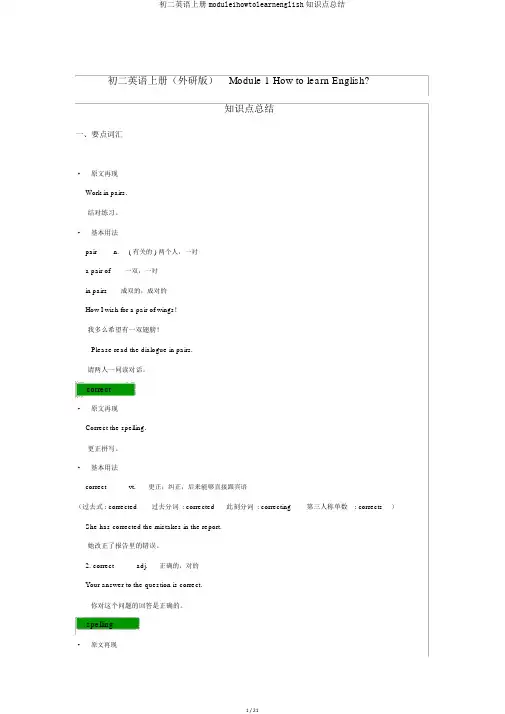
初二英语上册(外研版)Module 1 How to learn English?知识点总结一、要点词汇·原文再现Work in pairs.结对练习。
·基本用法pair n.( 有关的 ) 两个人,一对a pair of一双,一对in pairs成双的,成对的How I wish for a pair of wings!我多么希望有一双翅膀!Please read the dialogue in pairs.请两人一同读对话。
correct·原文再现Correct the spelling.更正拼写。
·基本用法correct vt.更正;纠正,后来能够直接跟宾语(过去式 : corrected过去分词: corrected此刻分词: correcting第三人称单数: corrects)She has corrected the mistakes in the report.她改正了报告里的错误。
2. correct adj.正确的,对的Your answer to the question is correct.你对这个问题的回答是正确的。
spelling·原文再现Correct the spelling.更正拼写。
·基本用法spelling n.拼写Don't make a mistake in your spelling.不要在拼法上犯错。
·知识拓展 -- 有关单词spell v.拼写I don't know how to spell your name.我不会拼写你的名字。
word·原文再现Listen and check the words you hear.听并检查听到的单词。
·基本用法word n.单词Take care to spell every word right.注意把每个词拼正确。
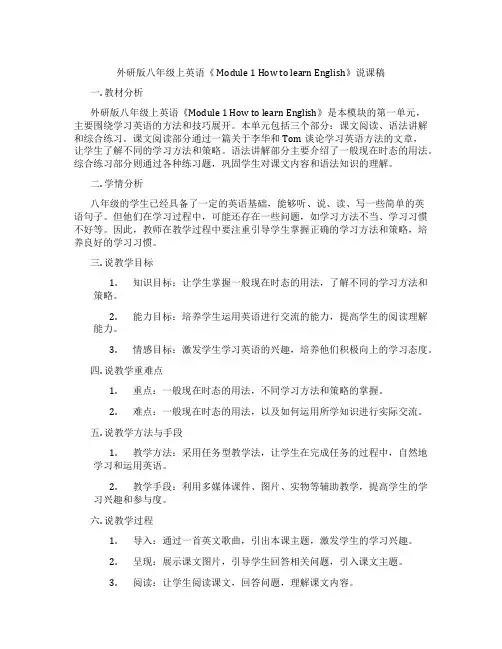
外研版八年级上英语《 Module 1 How to learn English》说课稿一. 教材分析外研版八年级上英语《Module 1 How to learn English》是本模块的第一单元,主要围绕学习英语的方法和技巧展开。
本单元包括三个部分:课文阅读、语法讲解和综合练习。
课文阅读部分通过一篇关于李华和Tom谈论学习英语方法的文章,让学生了解不同的学习方法和策略。
语法讲解部分主要介绍了一般现在时态的用法。
综合练习部分则通过各种练习题,巩固学生对课文内容和语法知识的理解。
二. 学情分析八年级的学生已经具备了一定的英语基础,能够听、说、读、写一些简单的英语句子。
但他们在学习过程中,可能还存在一些问题,如学习方法不当、学习习惯不好等。
因此,教师在教学过程中要注重引导学生掌握正确的学习方法和策略,培养良好的学习习惯。
三. 说教学目标1.知识目标:让学生掌握一般现在时态的用法,了解不同的学习方法和策略。
2.能力目标:培养学生运用英语进行交流的能力,提高学生的阅读理解能力。
3.情感目标:激发学生学习英语的兴趣,培养他们积极向上的学习态度。
四. 说教学重难点1.重点:一般现在时态的用法,不同学习方法和策略的掌握。
2.难点:一般现在时态的用法,以及如何运用所学知识进行实际交流。
五. 说教学方法与手段1.教学方法:采用任务型教学法,让学生在完成任务的过程中,自然地学习和运用英语。
2.教学手段:利用多媒体课件、图片、实物等辅助教学,提高学生的学习兴趣和参与度。
六. 说教学过程1.导入:通过一首英文歌曲,引出本课主题,激发学生的学习兴趣。
2.呈现:展示课文图片,引导学生回答相关问题,引入课文主题。
3.阅读:让学生阅读课文,回答问题,理解课文内容。
4.讲解:讲解一般现在时态的用法,让学生通过例句理解并掌握。
5.练习:让学生进行语法练习,巩固对一般现在时态的掌握。
6.交流:分组讨论,让学生分享自己的学习方法和策略,互相学习。
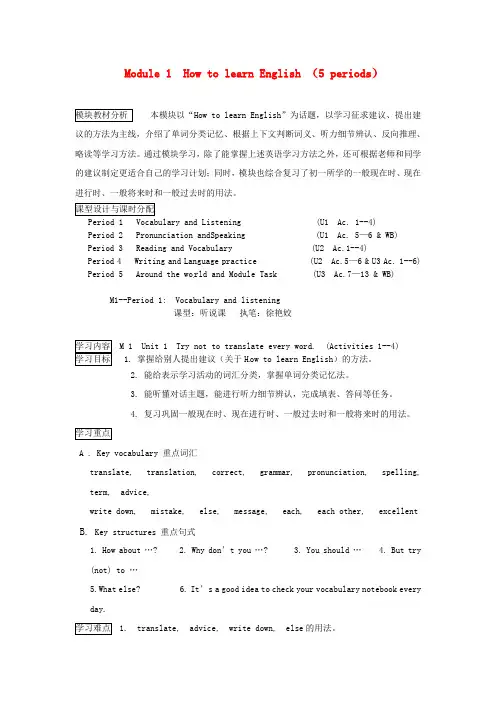
Module 1 How to learn English (5 periods)模块教材分析本模块以“How to learn English”为话题,以学习征求建议、提出建议的方法为主线,介绍了单词分类记忆、根据上下文判断词义、听力细节辨认、反向推理、略读等学习方法。
通过模块学习,除了能掌握上述英语学习方法之外,还可根据老师和同学的建议制定更适合自己的学习计划;同时,模块也综合复习了初一所学的一般现在时、现在进行时、一般将来时和一般过去时的用法。
课型设计与课时分配Period 1 Vocabulary and Listening (U1 Ac. 1--4)Period 2 Pronunciation andSpeaking (U1 Ac. 5—6 & WB)Period 3 Reading and Vocabulary (U2 Ac.1--4)Period 4 Writing and Language practice (U2 Ac.5—6 & U3 Ac. 1--6) Period 5 Around the wo rld and Module Task (U3 Ac.7—13 & WB)M1--Period 1: Vocabulary and listening课型:听说课执笔:徐艳姣学习内容 M 1 Unit 1 Try not to translate every word. (Activities 1--4)学习目标 1. 掌握给别人提出建议(关于H ow to learn English)的方法。
2. 能给表示学习活动的词汇分类,掌握单词分类记忆法。
3. 能听懂对话主题,能进行听力细节辨认,完成填表、答问等任务。
4. 复习巩固一般现在时、现在进行时、一般过去时和一般将来时的用法。
学习重点A . Key vocabulary 重点词汇translate, translation, correct, grammar, pronunciation, spelling, term, advice,write down, mistake, else, message, each, each other, excellentB.Key structures 重点句式1. How about …?2. Why don’t you …?3. You should …4. But try(not) to …5.What else?6. It’s a good idea to check your vocabulary notebook everyday.学习难点 1. translate, advice, write down, else的用法。
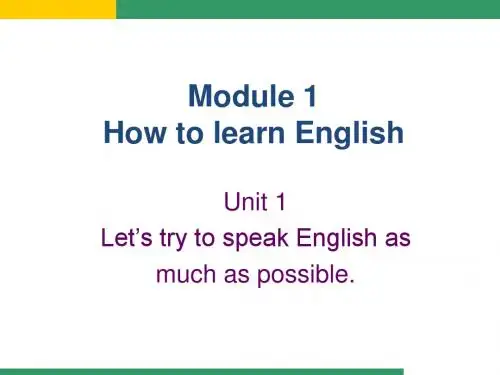
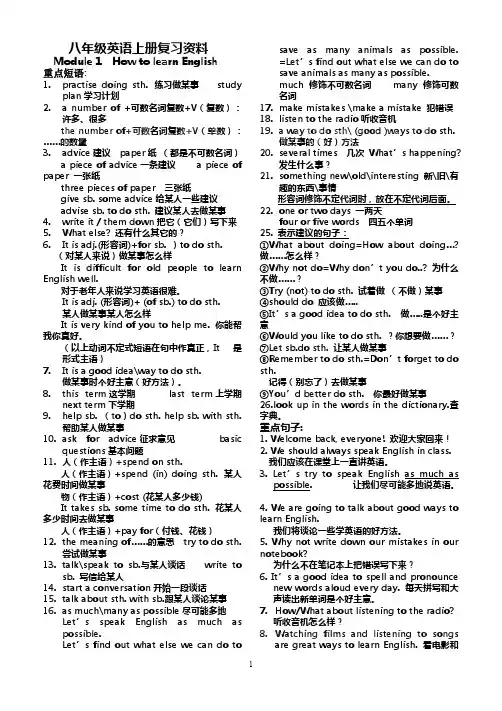
八年级英语上册复习资料Module 1 How to learn English重点短语:1.practise doing sth. 练习做某事studyplan学习计划2. a number of +可数名词复数+V(复数):许多、很多the number of+可数名词复数+V(单数):……的数量3.advice建议paper纸(都是不可数名词)a piece of advice一条建议 a piece of paper 一张纸three pieces of paper 三张纸give sb. some advice给某人一些建议advise sb. to do sth. 建议某人去做某事4.write it / them down把它(它们)写下来5.What else? 还有什么其它的?6.It is adj.(形容词)+for sb. )to do sth. (对某人来说)做某事怎么样It is difficult for old people to learn English well.对于老年人来说学习英语很难。
It is adj. (形容词)+ (of sb.) to do sth.某人做某事某人怎么样It is very kind of you to help me. 你能帮我你真好。
(以上动词不定式短语在句中作真正,It 是形式主语)7.It is a good idea\way to do sth.做某事时个好主意(好方法)。
8.this term这学期last term上学期next term下学期9.help sb. (to)do sth. help sb. with sth.帮助某人做某事10.ask for advice征求意见basicquestions基本问题11.人(作主语)+spend on sth.人(作主语)+spend (in) doing sth. 某人花费时间做某事物(作主语)+cost (花某人多少钱)It takes sb. some time to do sth. 花某人多少时间去做某事人(作主语)+pay for(付钱、花钱)12.the meaning of……的意思try to do sth.尝试做某事13.talk\speak to sb.与某人谈话write tosb. 写信给某人14.start a conversation开始一段谈话15.talk about sth. with sb.跟某人谈论某事16.as much\many as possible尽可能多地Let’s speak English as much as possible.Let’s find out what else we can do tosave as many animals as possible.=Let’s find out what else we can do tosave animals as many as possible.much 修饰不可数名词many 修饰可数名词17.make mistakes \make a mistake 犯错误18.listen to the radio听收音机19.a way to do sth\ (good )ways to do sth.做某事的(好)方法20.several times 几次What’s happening?发生什么事?21.something new\old\interesting 新\旧\有趣的东西\事情形容词修饰不定代词时,放在不定代词后面。
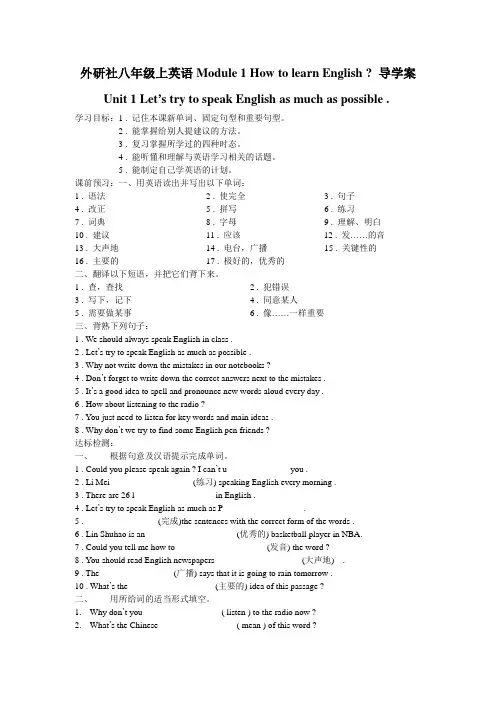
外研社八年级上英语Module 1 How to learn English ? 导学案Unit 1 Let’s try to speak English as much as possible .学习目标:1 . 记住本课新单词、固定句型和重要句型。
2 . 能掌握给别人提建议的方法。
3 . 复习掌握所学过的四种时态。
4 . 能听懂和理解与英语学习相关的话题。
5 . 能制定自己学英语的计划。
课前预习:一、用英语读出并写出以下单词:1 . 语法2 . 使完全3 . 句子4 . 改正5 . 拼写6 . 练习7 . 词典8 . 字母9 . 理解、明白10 . 建议11 . 应该12 . 发……的音13 . 大声地14 . 电台,广播15 . 关键性的16 . 主要的17 . 极好的,优秀的二、翻译以下短语,并把它们背下来。
1 . 查,查找2 . 犯错误3 . 写下,记下4 . 同意某人5 . 需要做某事6 . 像……一样重要三、背熟下列句子:1 . We should always speak English in class .2 . Let’s try to speak English as much as possible .3 . Why not write down the mistakes in our notebooks ?4 . Don’t forget to write down the correct answers next to the mistakes .5 . It’s a good idea to spell and pronounce new words aloud every day .6 . How about listening to the radio ?7 . You just need to listen for key words and main ideas .8 . Why don’t we try to find some English pen friends ?达标检测:一、根据句意及汉语提示完成单词。
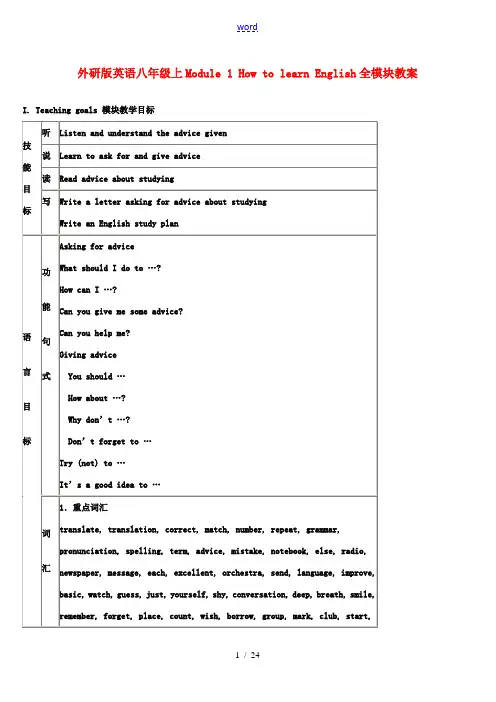
外研版英语八年级上Module 1 How to learn English全模块教案I. Teaching goals 模块教学目标II. Teaching material analyzing 教材分析本模块以“How to learn English”为话题,以学习征求建议、提出建议的方法为主线,介绍了单词分类记忆、根据上下文判断词义;听力细节辨认、反向推理;略读等学习方法。
通过模块学习,学生除了能掌握上述英语学习方法之外,还可以根据同学的建议制定更适合自己的学习计划;同时,模块也复习了一般现在时、现在进行时、一般过去时、一般将来时的用法。
Unit 1 通过听、读、说训练,初步学习给别人提建议的方法。
其中活动1要求将所给表示学习活动的词汇分类;活动2要求根据录音判断对话主题;活动3—5听读包含建议的对话并完成填表、答问等任务。
活动6学习英语中的连读法;活动7根据提示口头练习给别人提建议的方法。
Unit 2 通过读、写训练,学会向别人征求建议或给别人提出建议。
其中活动1要求学生列举自己在语言学习活动中遇到的实际困难。
活动2—4要求学生阅读一语言学习“问答专栏”中内容后完成补全句子、回答问题等练习。
活动5—6要求学生根据自己的学习实际,完成一封求助信并征求同学的建议。
Unit 3 对“提供学习建议”的功能项目进行综合训练,并在此基础上完成制定学习计划的任务。
其中活动1、2 要求听取Charlie和Mary的对话,选出所听到的表示建议的句式并完成问答练习。
活动3—5 要求根据所供图片,描述、评论Jack的学习、生活情况,并根据提示问题提出建议。
活动6要求阅读 Helen的问题并用所供表达完成Simon 的回信。
活动7—9是词汇的拓展训练:其中7要求根据图片写出单词;8用所供词汇组成短语;9用所供词汇完成句子。
Around the world给学生介绍了通过多种渠道学习英语的方法。
Module task要求学生反思自己的英语学习,通过图标明晰信息,并根据图标信息制定学习计划;然后小组交流,提出修改建议。
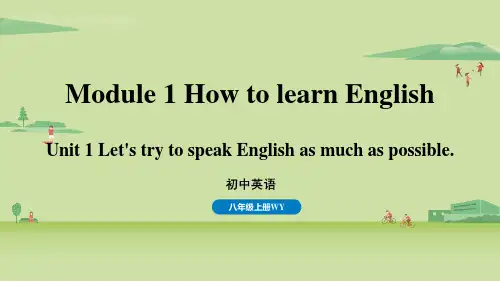
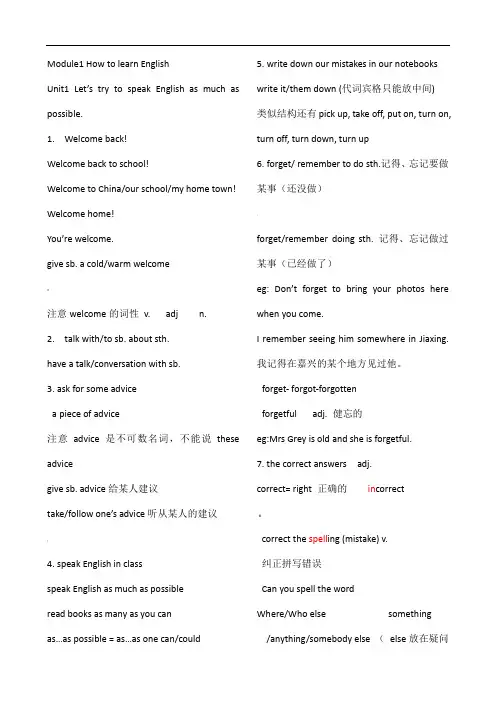
Module1 How to learn EnglishUnit1 Let’s try to speak English as much as possible.1.Welcome back!Welcome back to school!Welcome to China/our school/my home town! Welcome home!You’re welcome.give sb. a cold/warm welcome*注意welcome的词性v. adj n.2.talk with/to sb. about sth.have a talk/conversation with sb.3. ask for some advicea piece of advice注意advice是不可数名词,不能说these advicegive sb. advice给某人建议take/follow one’s advice听从某人的建议;4. speak English in classspeak English as much as possibleread books as many as you canas…as possible = as…as one can/could 5. write down our mistakes in our notebooks write it/them down (代词宾格只能放中间)类似结构还有pick up, take off, put on, turn on, turn off, turn down, turn up6. forget/ remember to do sth.记得、忘记要做某事(还没做)·forget/remember doing sth. 记得、忘记做过某事(已经做了)eg: Don’t forget to bring your photos here when you come.I remember seeing him somewhere in Jiaxing. 我记得在嘉兴的某个地方见过他。

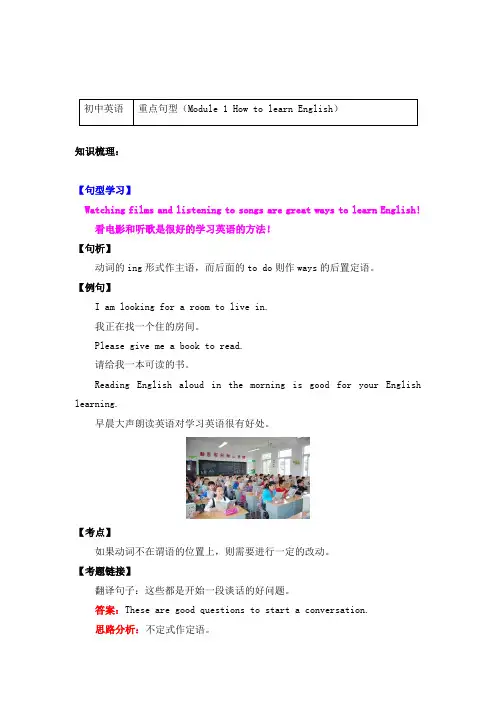
初中英语重点句型(Module 1 How to learn English)知识梳理:【句型学习】Watching films and listening to songs are great ways to learn English!看电影和听歌是很好的学习英语的方法!【句析】动词的ing形式作主语,而后面的to do则作ways的后置定语。
【例句】I am looking for a room to live in.我正在找一个住的房间。
Please give me a book to read.请给我一本可读的书。
Reading English aloud in the morning is good for your English learning.早晨大声朗读英语对学习英语很有好处。
【考点】如果动词不在谓语的位置上,则需要进行一定的改动。
【考题链接】翻译句子:这些都是开始一段谈话的好问题。
答案:These are good questions to start a conversation.思路分析:不定式作定语。
【课文朗读】Questions and answersSend your questions to Diana, the Language Doctor.Many students ask for advice about how to improve their English, Here are three basic questions.The first question is about understanding English films and songs. Li Hao from Hubei wrote, “I like watching English films and listening to English songs, but I don’t understand very much. What can I do?”Watching films and listening to songs are great ways to learn English! Watch and listen several times, and guess the meaning of the new words. Each time you will learn something new. I also advise you to talk about the films or songs with your friends.The second question is about speaking. Wang Fan from Jilin wrote, “Our school has a teacher from the US. I am shy and I am afraid to speak to her. What should I do?”You can say, “Hello! How are you?”“Do you like China?” These are good ways to start a conversation. And before you begin, you should smile at her! Remember this: Do not be shy. Just try.The third question is about vocabulary. Zhang Lei from Anhui wrote, “I write down new words, but I forget them quickly. How can I remember them?”Do not worry. It is natural to forget new words! I suggest you write four or five words a day on pieces of paper and place them in your room. Read the words when you see them, and try to use them.同步练习:(答题时间:15分钟)一、根据汉语完成句子,每空一词。
八上Module 1 How to learn English 一、短语归纳1. look up 差,查找2. make a mistake 犯错误3. talk about 谈论,讨论4. speak English 讲英语5. write down写下,记下6. next to 在….隔壁7.listen to the radio 听广播8. be good for 对…….有利处9. write to 给……..写信10. a little 有点11. agree with sb. 同意某人12. talk to 跟……交谈13. send….. to …..把……(发)送给某人14. ask for 请求(给予)15. watch films 看电影16. be from 来自17. smile at 冲……微笑18. go to bed 去睡觉19. get up 起床20. think about 考虑21. make friends with sb.与某人交朋友22. take sb. around. 带某人参观23. a few 几个,一些24. invite sb. to 邀请某人到…..25. be good at 擅长26. for example 例如二、Language points1. pair n.(相关的)两个人,一对【经典例句】Let’s play the game in pairs. 咱们两人一组做这个游戏。
【考点聚焦】(1) pairs 是名词pair 的复数形式。
(2) in pairs 表示“成双的,成对的”。
Let’s play the game in pairs. 咱们两人一组做这个游戏。
(3) a pair of 意为“一双、一副、一把……”a pair of shoes 一双鞋 a pair of glasses 一副眼镜2. correct v.更正【经典例句】You must correct the bad habits. 你必需更正这些坏习惯。
知识梳理:一、单词领读forget v. 忘记place v. 放置二、重点单词【单词学习】1. correct ☆v. 改正adj. 正确的【例句】I spent a lot of time correcting my mistakes.我花了大量的时间改正我的错误。
Don’t forget to write down the correct answers next to the mistakes.别忘了在错误的旁边写下正确的答案。
【拓展】1. correct具有两种词性,英语中这样的词还有:practice,complete,form,place。
2. correct的其它变化形式:correction(修改), corrective(矫正的)【考题链接】翻译句子:你能告诉我这道题的正确答案吗?答案:Can you tell me the correct answer to this question?思路分析:这里是correct作为形容词的用法,另外注意to的用法。
2. practise ☆☆☆v. 练习【用法】practise doing sth. 练习做某事【例句】We should practise saying the new words.我们应该练习说一说这些生词。
【考点】注意practise在英式英语中作为动词使用,名词形式是practice;而在美式英语当中,名词、动词都是practice。
The more you practice, the better you learn.你练习得越多,就学得越好。
【考题链接】翻译句子:他每天都用很多时间练习踢足球。
(用两种方法翻译)答案:He spends a lot of time practicing playing football every day.It takes him a lot of time to practice playing football every day.思路分析:注意“花费”的用法,以及practise后面用动词ing形式。
外研版八年级上英语《 Module 1 How to learn English》教学设计一. 教材分析《Module 1 How to learn English》是外研版八年级上英语教材的第一模块,主要介绍了学习英语的方法和技巧。
本模块共有三个单元,分别是:Unit 1:介绍了一些基本的学习英语的方法,如记忆单词和短语、练习听力和口语等。
Unit 2:讨论了一些提高英语水平的方法,如多读英语文章、观看英语电影等。
Unit 3:介绍了一些在学习英语过程中可能会遇到的问题及解决方法。
本模块的内容与学生的日常生活和学习密切相关,有利于激发学生的学习兴趣和积极性。
二. 学情分析八年级的学生已经掌握了一定的英语基础知识,具备一定的听、说、读、写的能力。
但是,他们的英语水平参差不齐,部分学生对英语学习失去了兴趣,学习积极性不高。
此外,他们对学习英语的方法和技巧了解不多,需要在本模块中进行系统的学习和掌握。
三. 教学目标1.知识目标:学生能够掌握本模块中出现的单词、短语和句型,了解学习英语的方法和技巧。
2.能力目标:学生能够运用所学知识和技巧进行日常英语交流,提高英语听、说、读、写的能力。
3.情感目标:激发学生学习英语的兴趣和积极性,帮助他们建立自信,培养良好的学习习惯。
四. 教学重难点1.重点:单词、短语和句型的学习和运用。
2.难点:学习英语的方法和技巧的掌握。
五. 教学方法1.任务型教学法:通过完成各种任务,让学生在实践中学习和运用英语。
2.情境教学法:创设真实的语境,让学生在具体的情境中学习和运用英语。
3.合作学习法:鼓励学生之间相互合作,共同完成学习任务。
六. 教学准备1.教材:外研版八年级上英语教材。
2.课件:制作与教材内容相关的课件。
3.教学资源:收集与学习英语方法和技巧相关的资料,如英语电影、文章等。
4.教学设备:投影仪、电脑、音响等。
七. 教学过程1.导入(5分钟)利用课件展示一些与学习英语相关的图片,如单词卡片、英语电影海报等,引导学生思考和学习英语的方法和技巧。
Module 1 How to learn EnglishUnit 1Let's try to speak English as much as possible.知识讲解知识点1 Practise /'præktIs/ v. 练习、训练考向一【重点】practise+名词、代词、动名词,不能接不定式。
eg:They're practising singing the new song. 他们正在练习唱那首新歌。
注意practice名词“练习”一般为不可数名词。
在英国英语中,practise v.和practice n.在美国英语中,practise和practice都可以是v.或n.考向二【易错点】practise后跟动名词作宾语,类似的动词(短语)还有:finish enjoy suggest keep mind miss avoidlook forward to have trouble in典例Before she went abroad, she spent as much time as she could___ English.A.to practise to speakB. practising speakingC. to practise speakingD. practising to speak【点拨】在她出国之前,她用了尽可能多的时间练习说英语。
这里考查两个动词的搭配。
第一个,spend time on sth./in doing sth.中in可省略,花时间在某事上/做某事:第二个practise后接动名词,不接不定式。
考向三【重点】practise与exercise的辨析practice:有规律地练习,特指反复练习。
eg:He practises English every day.他每天练习英语。
exercise:指训练,锻炼,操练。
外研版八上英语知识点归纳英语初二上册重点知识点讲解Module 1 How to learn English1. advice(1)意思是“意见,建议”,为不可数名词,可用some,much,a piece of,pieces of等修饰,不能说an advice或many/a few advices。
(2)表示“有关……的建议”时,用介词on,接名词、代词或由疑问词引导的不定式。
e.g. Let’s ask for his advice on what to do next.常见搭配:take/follow one’s advice接受某人的建议ask for advice征求意见拓展:advise vt.建议常见搭配:XXX.XXX me to leave now.老师建议我现在就离开。
2.Each time you will learn something new. I also advise you to talk about the XXX.每次你将会研究一些新东西。
我也建议你和朋友们谈论电影或歌曲。
time的用法:(1)time指“时间”用作不可数名词,前面可much, little, a lot of, plenty of等修饰。
(2)当作“次数;倍数”讲时,time 是可数名词。
e.g.I have been to Beijing three times.(3)time构成的短语:XXX一次,每一次XXX曾经,一度at times /from time to time有时,偶尔all the time总是,一直in time实时,早晚on time定时(4)time构成的句型:①It’s time for sb. to do sth./It’s (high) time sb. did sth.该是或人干……的时间了。
e.g. It’s time for children to go to bed.是小孩睡觉的时分了。
教学设计活动意图:总结了本模块用于提建议的句型,组织学生归纳分析,适当比对,扩充句型,以便于学生在后续语言活动中对这些句型灵活运用。
环节二教师活动2Step 2 Listening practice.Task 1. Listen and check (√) the expressions of advice you hear in Activity 1.1. Ask the students to read through the seven stems individually.1. Why don’t we…?2. How about …?3. We should…4. We can…5. Let’s try to…6. Can you …?7. Remember to…2. Play the tape.3. Ask the students to check with a partner.4. Check the answers:Task 2. Listen again and answer the questions in Activity 2.1. Ask the students to read through the questions individually.1) What’s difficult for Charlie?2) How will Mary help him?3) When does Charlie think they should meet? Ask students to listen to the sentences carefully.Then check answers one by one.Keys:1. The English homework is difficult for him.2. Mary will work with him.3. Charlie thinks that they should meet after school.4. Mary thinks reading newspapers is a good idea.4) What does Mary think about readingnewspapers?2. Play the tape.3. Ask the students to check with apartner.4. Check the answers:活动意图:要求学生对对话中提到的表示建议的句型进行判断、选择和回答,是浅层次的听力理解,不涉及语法,作用是展示句型,帮助学生区分各类句型。
Module 1 How to learn English?模块综合测试题(测试时间45分钟总分100分)第Ⅰ卷(共50分)Ⅰ. 听力(10分)(Ⅰ)录音中有五个句子, 听一遍后, 选择最佳答案。
(5分)1. A. That’s a good idea. B. Yes, of course.C. That’s right.2. A. Don’t worry about them.B. I’m afraid not.C. Thank you.3. A. Sure. Here you are. B. You’re welcome.C. Sorry, it’s mine.4. A. Are you ready?B. Why do you think so?C. Good idea.5. A. Every day. B. OK, I won’t.C. Don’t say so.(Ⅱ)录音中有一篇短文, 听两遍后, 完成下列表格。
(5分)6. ______7. ______8. ______9. ______ 10. ______ 【来源:】Ⅱ. 单项选择(10分)1. In a ______ lesson, you can learn how to read words correctly.A. pronunciationB. grammarC. spellingD. translation2. —Don’ t forget ______ your English book tomorrow morning. —Thanks. I won’t.A. bringB. to bringC. bringingD. brought3. — ______ do you want to ask?—Nothing. Thank you.A. What otherB. What elseC. Other whatD. Else what4. —When ______ you ______ to learn to skate?—Five years ago.A. do; startB. will; startC. has; startD. did; start5. Tomorrow is Teachers’day. ______ give our teacher, Mr Liu, some flowers?A. What aboutB. Why don’tC. Why notD. How about6. It’s a good habit ______ English aloud every morning.A. readB. to readC. readingD. reads7. Listen! The phone ______ . Please go to answer it. 【】A. ringsB. is ringingC. rangD. will ring8. —Could you please tell me ______ the camera?—I don’t know, either.A. how to usingB. what to useC. how to useD. how using9. ______ time with family and friends ______ very important to us.A. Spend; isB. Spend; areC. Spending; isD. Spending; are10. If you want to learn English well, you should ______ some English every day.A. readB. to readC. readingD. readsⅢ. 完形填空(20分)In learning English, one should first pay attention to listening and speaking. It is the groundwork of reading and writing. You’d better1your best to speak when you do some listening. Don’t be2of making mistakes. But be careful not to let them stop you from improving your3. While you are doing this, a good4is to write—keep a diary, write notes or letters. Then if you can, ask some others to go through5you have written and tell you where it is wrong. Many mistakes in your speaking will be6found when you write. Through correcting mistakes, you can do better in learning English.If you are slow in speaking, don’t7about it. One of the helpful ways is reading, either aloud or to yourself. The important thing is to choose8interesting to read. It can’t be too difficult for you. When you are reading9this way, don’t stop to10the new words if you can guess their meanings when they have nothingto do with the sentences. You can do that some other time.1. A. have B. send C. make D. try2. A. sure B. afraid C. proud D. tired3. A. English B. Chinese C. Korean D. French4. A. start B. idea C. way D. manner5. A. how B. when C. why D. what6. A. happily B. easily C. really D. slowly7. A. talk B. fear C. worry D. hurry8. A. something B. everythingC. anythingD. nothing9. A. by B. on C. at D. in10. A. look at B. look forC. look upD. look overⅣ. 阅读理解(10分)Everybody wants to learn English well but many find it not easy. I’m here to share my ideas about learning English with you.For some students, to remember new words is a big problem. In fact, words always come along with sentences, so you can understand words in sentences. And you’d better review(复习)them now and then, or you will forget them easily.When reading, I like to write some special and important phrases(短语)down in the notebook so that I can remember them well and use them in my next reading. Studying by using is a good way to learn English.After class, I go to the library sometimes. There are many books, newspapersand magazines in English. I usually read some of them for a long time there. It can help with my reading.At school, on every weekend, I go to English club to talk with others in English.I am used to improving my oral English in this way.Do you know CCTV-10? I like to watch it whenever it’s possible. The programme called Outlook is my favourite. In it some teachers or scholars(学者)talk about helpful learning skills(技巧).We still have so much to learn about English. Never give up(放弃), and you’ll succeed one day.1. What does the underlined word “them” refer to(指)?A. Words.B. Phrases.C. Sentences.D. Grammar.2. How many ways of learning English does the writer tell us?A. Three.B. Four.C. Five.D. Six.3. What does the writer usually do to improve his reading?A. Remember new words in sentences.B. Take notes and read articles(文章)in English.C. Go to the English club.D. Watch English programmes often.4. Which of the following has the same meaning as the underlined phrase“oral English”?A. English listening.B. Spoken English.C. English reading.D. Written English.5. What does the writer mainly want to tell us?A. His school life.B. An English club.C. The story about his school.D. His ways of learning English.第Ⅱ卷(共50分)Ⅴ. 词汇运用(20分)(Ⅰ)根据句意及首字母提示完成单词。